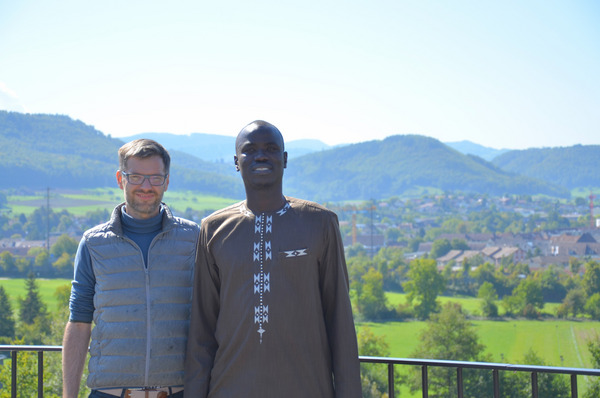What is your background?
I am an economist by training. I did all my studies at the Cheikh Anta Diop University of Dakar, where I now work as a lecturer in the Faculty of Economics and Management.
Today, I have a triple role at UCAD. Firstly, I teach first-year students fundamental courses such as macroeconomics, microeconomics and statistics, but also specialised courses, such as agricultural economics, value chain analysis, evaluation and project management. Secondly, I am the deputy director of the WASCAL doctoral programme, where I am responsible for the coordination and monitoring of the student's research work. Thirdly, I am the Head of the Office of the Centre for University Pedagogy at the Directorate of Pedagogical Affairs of UCAD with the mission of accompanying training programmes to meet quality standards.
Before the University, I worked as a research fellow at the Institut Sénégalais de Recherches Agricoles (ISRA) between 2012 and 2016. I also have a lot of experience in research and development projects in Senegal with partners from universities and research centres recognised in the fields of climate change, development of agricultural value chains, etc. I also had the opportunity to benefit from some scientific stays at IDRC (Clermont-Ferrand), CIRAD (Montpelier), IFPRI (Washington) and the University of Paris-Nanterre.
What role do you play in SustainSahel?
In the SustainSahel project, I coordinate the activities of WP3: Adoption and scaling pathways in Senegal under the supervision of Christian Grovermann. Our WP operates strictly in the sites of Niakhar in Senegal and Koulikoro in Mali and aims to (i) identify adoption factors, (ii) assess the impact of agroecological innovations disseminated by the project, and (iii) scale up agroecological practices.
How does your work contribute to our understanding of agroforestry in the Sahel in general?
The overall objective of the SustainSahel project is to implement a demand-driven, multi-stakeholder approach to facilitate the use of research results on sustainable intensification. The contribution of WP3 is to produce solid evidence of the effectiveness of capacity building for Sahel producers through their exposure to technological innovations related to the integration of shrubs, bushes and livestock into production systems.
To do this, we will rely on household survey data collected before and after the project interventions in beneficiary and control villages using a Randomised Controlled Trial approach. We, therefore, put forward several hypotheses that we will test:
First hypothesis: the effect on income that would result from potential savings in direct expenses resulting from the reduction in the use of external inputs (e.g. chemical fertilisers, insecticides, herbicides) through the use of sustainable intensification technologies. The savings could in turn be used for household investments in productive inputs and thus improve household welfare.
Second hypothesis: improved yields and resilience through the enhancement of soil fertility, which could increase animal and plant productivity and thus improve food security and/or dietary diversity of rural populations.
What can you say thus far about the adoption pathways of agroforestry practices in the Sahel?
Our initial results confirm the agroforestry potential of the Sahel, which through proper integration of certain trees and shrubs into production systems can sustainably improve human, animal and environmental ecosystems, and thus make its revolution 'greener'. To do this, policy makers need to be informed by evidence-based research recommendations on the ways in which the adoption of agroforestry practices can be achieved. This is the focus of our first deliverable, the results of which highlight the economic viability of existing shrub integration techniques as well as the factors and constraints for promoting intensification strategies through the analysis of understanding, use and discontinuation of the use of agroecological innovations.
The results show that access to extension and participation in training enhance awareness of agroforestry-based soil fertility management. Similarly, information provided by public extension, NGOs and community members is strongly associated with higher adoption intensity. Therefore, strengthening public extension systems that fully engage with local knowledge networks is essential to support the transition to agroforestry-based soil fertility management.
What was the highlight of your exchange month at FiBL Switzerland?
I definitely came back from FiBL with a better understanding of agro-ecological agriculture thanks to the formal and informal exchanges with researchers specialised in organic agriculture.
Among the highlights of my stay were the presentations I gave in various departments about my research work. These presentations were very beneficial because they allowed me to get feedback on my work and also to lay the foundations for cooperation and partnerships that are undoubtedly promising for the sustainability of our interventions for the benefit of our producers.
Secondly, the visits I made to FiBL's experimental fields with researchers from the livestock and crop production departments taught me a lot. I realised that sustainable agriculture does not necessarily mean lower yields. Indeed, the technological innovations developed around organic fertilisers and biological control guarantee a healthy, intensive and environmentally friendly agriculture.
I was also struck by the interest of FiBL researchers in agroecology in the Sahel. The next steps will certainly confirm the opportunity of such a visit thanks to the publications on which we have made good progress as well as the partnerships that should take place in several forms.
I cannot end this interview without thanking all the FiBL staff who spared no effort to make this scientific visit a success.
Written by: Dr. Assane Beye, co-lead WP3 activities in Senegal, ISRA
Further information
Weblinks
Researchgate.net: Assane Beye's profile

 tap and then scroll down to the Add to Home Screen command.
tap and then scroll down to the Add to Home Screen command.